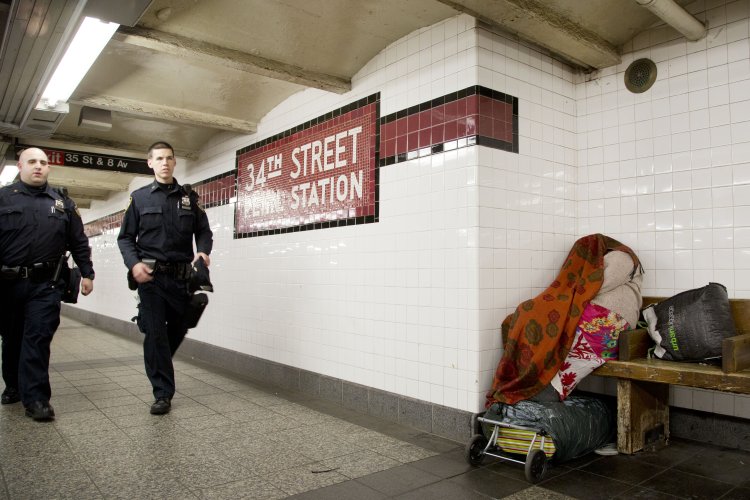New York simplifies the process of committing individuals with severe mental illnesses
The change advocated by Gov. Kathy Hochul highlights a growing Democratic backing for coercive methods in addressing mental health crises.

The agreement includes state funding for pilot programs that will send unarmed first responders to mental health crises, along with plans to assemble at least four panels tasked with reviewing instances where these responders are accused of using excessive force, according to two sources familiar with the matter who spoke on condition of anonymity. These details have not been previously disclosed and are in addition to a tentative requirement for law enforcement officers to receive specialized training to improve their responses to mental health emergencies.
The core of the new policy allows New York state to authorize first responders to forcibly admit mentally ill individuals to hospitals if they are unable to meet essential needs such as food, shelter, or medical care. Hochul announced on Monday that she reached an agreement with Senate Majority Leader Andrea Stewart-Cousins and Assembly Speaker Carl Heastie on a budget deal incorporating this new standard.
“In a post-Covid world, there have been very difficult examples of mental health issues, and we’ve been trying to address those issues in every possible way,” Stewart-Cousins explained to reporters on Tuesday. “I think it was a natural evolution of thought based on what appeared to be an unusual uptick — again in a post-Covid world — for something that we could have addressed.”
Across the country, Democratic officials have increasingly supported civil commitments as a way to tackle the intertwining crises of homelessness, mental illness, and crime in their communities. For instance, California established a new pathway to court-ordered treatment several years ago, while Oregon is currently deliberating on whether to expand its own civil commitment law. Hochul’s successful initiative this year illustrates a growing coalition advocating for involuntary treatment, as politicians strive to assure the public they are making progress on a complex issue often linked to public safety.
“It might be a sign that the country’s just moving a little more to the center of the road and is losing patience and faith in the fact that community-based services are the way to go,” noted Patrick Wildes, Hochul’s former assistant secretary for human services and mental hygiene, during an interview with PMG.
The upcoming policy change in New York, part of a $254 billion state budget deal proclaimed on Monday, effectively codifies existing state guidelines from 2022 stipulating that individuals “who appear to be mentally ill and who display an inability to meet basic living needs” can be taken involuntarily to a hospital for a psychiatric evaluation.
Resistance from civil rights and mental health advocacy groups has long made many New York Democrats wary of engaging with the issue, yet attitudes have slowly evolved in recent years. A series of high-profile violent incidents—such as the death of Michelle Go, who was pushed in front of a subway train in January 2022—spurred some Democrats to reconsider the topic as New York emerged from the pandemic. Hochul faced an unexpectedly tight election that year after her Republican opponent capitalized on rising crime rates, leading her to secure goodwill with a $1 billion mental health initiative the following year.
Hochul is now preparing for her 2026 reelection campaign, anticipated to present challenges from both the left and right, and legislative leaders have shown a willingness to support the new "gravely disabled" standard for involuntary hospitalization as part of a broader mental health reform package.
Lisa Dailey, executive director of the Treatment Advocacy Center advocating for increased involuntary treatment, stated that the new commitment standard aligns New York with nearly all other states. “This will help New York first responders and hospitals to act consistently and be inclusive of those who are the most ill,” she expressed in a statement to PMG.
However, the shifting approach remains a point of contention. Assembly Mental Health Chair Jo Anne Simon conveyed that the involuntary commitment policy was included in the budget against her better judgment, though she views the pilot programs and incident review panels as positive steps. “The governor sees her proposal as a win, but I think, frankly, too many New Yorkers will end up losing,” Simon remarked to PMG. “I don't like the idea of compromise when that means that we're doing something that I feel is fundamentally flawed. On the other hand, sometimes people need to see that it's fundamentally flawed.”
Simon warned that without substantial investment in post-discharge resources like housing and outpatient care, the expansion of involuntary commitment will likely fall short, addressing only part of the issue. “I think that if all you’re doing is beefing up one leg of a three-legged stool, it’s going to wobble, right?” she said.
Wildes, now director of Albany Law School’s Government Law Center, pointed out that the change appears more focused on expediency than a genuine long-term solution for homelessness and mental health problems. “If you really want to fix some of these problems, you’re talking about sustained investments,” he stated. “It’s really hard to sell that politically.”
Emily Johnson for TROIB News












